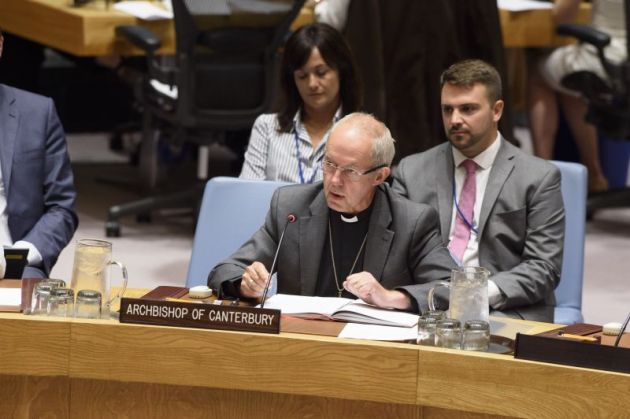Archbishop of Canterbury addresses UN Security Council on uses of mediation

The Archbishop of Canterbury Justin Welby has briefed the UN Security Council in New York on mediation and conflict resolution urging it not move beyond "fragmented" efforts to engage faith-based bodies in reconciliation.
Welby is the first Archbishop of Canterbury to address the body, invited to do so by the UK's Permanent Representative to the UN, Karen Pierce. The Church Times reported.
The Archbishop of Canterbury is the senior bishop and principal leader of the Church of England and the symbolic head of the 79-million strong worldwide Anglican Communion.
Welby told the UNSC on Aug. 31 that "the international rule-based order is struggling."
"The Church and other faith communities are intimately present where there are conflicts," said the archbishop who was an exucutive in the international oil industry before joining the Anglican ministry. "We cannot and will not walk away from them."
He said the Church needs to complement mediation and the whole conflict cycle within the framework of reconciliation.
"The vision of the UN's founders was no less than to abolish conflict. We have avoided global, nuclear war, yet not its continuing menace."
Yet short-term advantage for one interest leads to long-term destruction for all, through great wars and through small conflicts, he added.
"Reconciliation is not an act that comes at the end of the conflict cycle," he said. "It must become the framework that enables us to sustain peace and avoid conflict cycles repeating with ever-increasing destructive force," said Welby.
He further asked if approaches to reconciliation are currently adequate, especially using local, religious and traditional sources of peacemaking.
"Even in this time of uncertainty, and renewed international rivalry, for the sake of future peace we must invest in reconciliation and learn how to support transformation in human relationships better," said the Anglican leader, according to the World Council of Churches.
"The role that an institution like the Church plays here is significant."
Religious institutions are often the only functioning institution in a fragile or pre-conflict situation.
"They are present before, during and after conflict," he said. "They provide early warning for signs of conflict in communities."
Welby noted that large tracts of territory around the world are violently contested, in situations where governments have failed.
"As we think about new and innovative approaches to conflict prevention, this is an example of how the UN, member states and faith actors can be allies, with the potential for transformational results," the archbishop said.